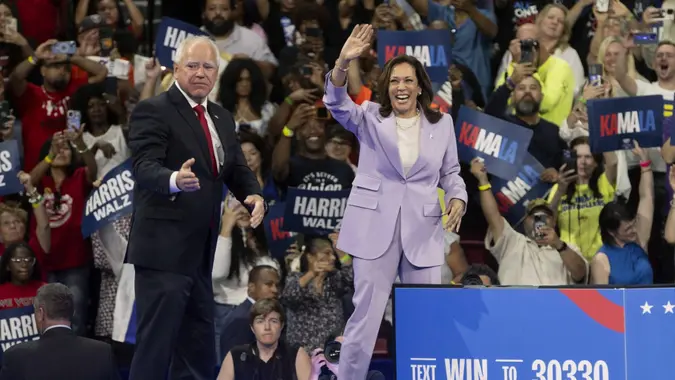Harris and Walz’s Past With Social Security: What Could It Mean for the Program?

Commitment to Our Readers
GOBankingRates' editorial team is committed to bringing you unbiased reviews and information. We use data-driven methodologies to evaluate financial products and services - our reviews and ratings are not influenced by advertisers. You can read more about our editorial guidelines and our products and services review methodology.

20 Years
Helping You Live Richer

Reviewed
by Experts

Trusted by
Millions of Readers
No matter who wins the presidential election this year — Vice President Kamala Harris or ex-President Donald Trump — they’ll need to figure out a way to deal with a troubled Social Security program. Should Harris and running mate Tim Walz win, you can expect them to embrace many of the Biden administration’s policies while also expanding protections for the program and its beneficiaries.
Future Is Uncertain
Much of the current Social Security debate centers on its uncertain future. The program’s Old Age and Survivors Insurance (OASI) Trust Fund is expected to run out of money within the next decade, leaving Social Security solely dependent on payroll taxes. Those taxes currently cover only about 77% of benefits.
Beyond that, there is general dissatisfaction about how effective current Social Security checks are at paying the bills. A survey conducted last year by public interest law firm Atticus found that nearly two-thirds of Social Security recipients are dissatisfied with the 3.2% cost-of-living adjustment (COLA) for 2024.
Harris has not rolled out specific Social Security proposals since she became the Democratic nominee following President Joe Biden’s decision to step aside. But she has worked closely with Biden on formulating various fiscal policies.
One of those policies is a four-point plan to strengthen Social Security that would mostly impact high earners who can depend on their retirement savings to get by. The plan includes the following:
- Tax earned income above $400,000, leaving wages between $160,200 (the cap at the time Biden made the proposal) and $400,000 untaxed. In 2024, any wages above $168,600 are not taxed.
- Change the calculation for determining annual COLAs so they are no longer based on the Consumer Price Index for Urban Wage Earners and Clerical Workers (CPI-W). Biden favors basing the COLA on the Consumer Price Index for the Elderly (CPI-E).
- Raise the primary insurance amount that determines how much money you’ll receive in Social Security benefits.
- Raise the special minimum benefit for lifetime lower-wage workers to 125% of the federal poverty level for Social Security beneficiaries.
What Harris and Walz Have Done
Like Biden, Harris has vowed to “protect” and “strengthen” Social Security, NewsNation reported, although details remain sketchy. While serving in the U.S. Senate, Harris co-sponsored the Social Security Expansion Act, which aimed to increase benefits for some, change how COLAs are calculated and extend the Social Security payroll tax to incomes over $250,000 a year.
Harris is unlikely to cut benefits for Social Security recipients as a way of dealing with the looming funding shortfall. That puts her in opposition to certain lawmakers who either want to reduce benefits or raise the full retirement age.
As for Walz: As governor of Minnesota he has supported legislation that would get rid of taxes on Social Security benefits “for a large number of Minnesotans,” Newsweek reported. Minnesota is one of only 12 states that still impose state income taxes on benefits.
“I don’t think those at the top of the line — millionaires and billionaires — are concerned about the Social Security tax,” Walz told MPR News in December 2022, meaning he might support eliminating the tax for 90% of Minnesota’s Social Security beneficiaries.
Ex-president and 2024 GOP nominee Donald Trump has floated the idea of getting rid of federal income taxes on Social Security benefits. Neither Harris nor Walz have offered up similar proposals publicly — perhaps because such a proposal would accelerate the program’s insolvency.
Meanwhile, last year, Walz increased the state tax exemption for Social Security benefits in Minnesota, CNBC reported. Taxpayers with less than $78,000 adjusted gross income ($100,000 for married joint filers) could subtract Social Security benefits from their earnings in 2023.
Editor’s note on election coverage: GOBankingRates is nonpartisan and strives to cover all aspects of the economy objectively and present balanced reports on politically focused finance stories. For more coverage on this topic, please check out What a Trump Presidency Could Mean for Social Security in 2025.
 Written by
Written by  Edited by
Edited by 























